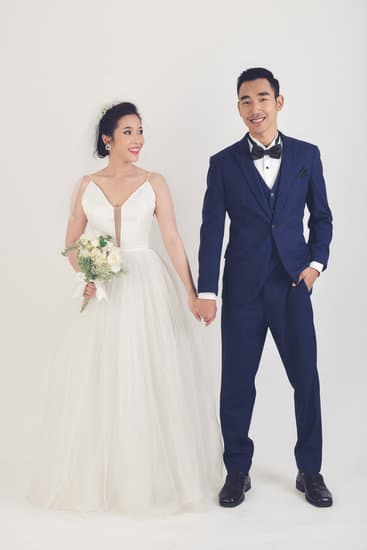How do you respond to a wedding invitation? Responding to a wedding invitation is an important step in the wedding planning process, and it’s essential to do so in a polite and timely manner. Understanding the etiquette of responding to a wedding invitation can help ensure that you handle the RSVP request appropriately.
When you receive a wedding invitation, it’s crucial to understand the meaning of the “RSVP” request. This acronym stands for “répondez s’il vous plaît,” which is French for “please respond.” In essence, it is a request for you to confirm whether or not you will be attending the wedding.
Traditionally, there were specific methods for responding to a wedding invitation, such as mailing back the response card or sending a written note. However, with the rise of technology, modern RSVP methods have become more common. It’s important to be familiar with both traditional and modern ways of responding in order to choose the most appropriate method for each individual wedding invitation you receive.
Understanding the RSVP Request
When it comes to responding to a wedding invitation, understanding the RSVP request is crucial. “RSVP” stands for the French phrase “répondez s’il vous plaît,” which translates to “please respond” in English. This simple phrase indicates the importance of notifying the couple of your attendance or absence at their wedding. Understanding this request means acknowledging the significance of your response in helping the couple make necessary arrangements for their big day.
The RSVP request is typically included in the wedding invitation and often includes a specific date by which guests are asked to respond. It is important to take note of this deadline and respond in a timely manner. By doing so, you are showing respect for the couple’s planning process and assisting them in finalizing details such as seating arrangements, catering, and other logistics for their wedding day.
In some cases, couples may also include additional information with their RSVP request, such as meal preferences, dietary restrictions, or song requests. Paying attention to these details and providing relevant information when you respond not only demonstrates your understanding of the RSVP request but also reflects your thoughtfulness as a guest. Whether through traditional methods or modern ways of responding, understanding the RSVP request sets the tone for handling wedding invitations with courtesy and consideration.
Traditional RSVP Methods
When it comes to responding to a wedding invitation, there are traditional methods that have been followed for many years. One of the most common ways to RSVP is by sending back the response card that is usually included in the invitation.
The response card typically includes options such as “accepts with pleasure” or “regretfully declines” along with space for your name and the number of guests attending. This method allows the couple to easily keep track of who will be attending their special day.
Another traditional way to RSVP is by writing a formal letter in response to the invitation. This letter should express your gratitude for being invited and provide a clear answer regarding whether you will be attending the wedding. It is important to use formal language and address the letter properly in order to show respect to the couple who has invited you.
In some cases, couples may also include a phone number or email address where guests can send their RSVPs. While this method may not be as traditional as mailing back a response card, it still provides an efficient way for guests to respond and for the couple to keep track of their guest list.
No matter which traditional method you choose, it is important to respond in a timely manner and with gratitude for being included in such a momentous occasion.
Modern RSVP Methods
In today’s digital age, there are several modern methods for responding to a wedding invitation. Couples are increasingly using technology to manage their guest lists and make the RSVP process easier for both themselves and their invitees.
- Online RSVP Platforms: Many couples are opting for online RSVP platforms, where guests can easily respond to their invitation through a website or app. These platforms allow guests to quickly indicate whether they will be attending, select their menu choices, and provide any additional information requested by the couple.
- Email Responses: Another popular modern method is to simply respond to the wedding invitation via email. This allows guests to provide their response directly to the couple with just a few clicks. It’s a convenient option for both the guest and the couple, as it eliminates the need for physical mail.
- Text Message RSVPs: Some couples may even opt for text message RSVPs, especially for more casual or intimate weddings. Guests can quickly confirm their attendance or send their regrets via text message, making it a simple and informal way to respond.
Using these modern RSVP methods has become increasingly common due to their convenience and efficiency. However, it’s important for guests to ensure that they follow any specific instructions provided by the couple regarding how they would like their RSVPs submitted. Whether it’s through an online platform, email, or text message, responding promptly and politely is key when using modern methods of RSVPing.
Remember that regardless of the method you choose to respond with-whether traditional or modern-it’s essential to do so in a timely manner and express your gratitude for being invited.
Tips for Writing a Polite Response
When it comes to responding to a wedding invitation, it’s important to do so with politeness and thoughtfulness. Here are some tips for writing a polite response:
- Express your gratitude: Begin by expressing your gratitude for the invitation. Whether you can attend or not, it’s important to convey appreciation for being included in such a special event.
- Be clear and concise: Your response should be clear and concise. If you can attend, simply state “accepts with pleasure” or “RSVP yes”. If you cannot attend, a simple “regrets” is sufficient.
- Include important details: If the invitation includes space for dietary restrictions or song requests, be sure to include this information in your response. This will show that you have carefully read the invitation and are considerate of the couple’s needs.
Remember that responding to a wedding invitation is not only an etiquette requirement but also a way to show respect and appreciation for the couple. With these tips, you can ensure that your response is polite and thoughtful.
How to Handle Plus-One Invitations
When receiving a wedding invitation with a plus-one, it’s important to respond in a polite and timely manner. The “plus-one” indicates that you are invited to bring a guest to the wedding, whether it be a significant other, friend, or family member. Your response should clearly indicate whether or not you will be attending alone or with a guest.
If you plan to attend the wedding with a plus-one, make sure to indicate the name of your guest when sending in your RSVP. This is especially important for the couple to keep an accurate headcount for their guests and seating arrangements.
If you are unsure of who your guest will be at the time of receiving the invitation, it’s acceptable to send in your RSVP without including your plus-one’s name and inform the couple at a later date.
It’s also important to understand that not all wedding invitations include a plus-one. Some couples may have budget constraints or limited venue space and may only invite specific individuals by name. In this case, it’s important to respect their decision and kindly decline any requests for an additional guest if none was specified in the invitation.
RSVP Timeline and Deadlines
Understanding the Importance of RSVP Deadlines
When you receive a wedding invitation, it is essential to take note of the RSVP deadline provided by the couple. The RSVP deadline is not arbitrary; it is crucial for the couple to finalize their guest list, seating arrangements, and catering plans. By responding by the specified deadline, you are assisting the couple in making important decisions regarding their big day. It also shows respect for the couple’s planning and helps them in managing their budget effectively.
Responding in a Timely Manner
Upon receiving a wedding invitation, it’s important to respond as promptly as possible. This gives the couple ample time to make necessary arrangements based on the number of guests attending. If there is an unavoidable delay or uncertainty about your availability, it’s courteous to communicate with the couple well before the given deadline.
Communicating Special Circumstances
If you anticipate difficulties in adhering to the RSVP deadline due to specific circumstances (such as health issues or travel delays), it is considerate to inform the couple as soon as possible. Communicate honestly about your situation with them and express your regret for any inconvenience caused. Most couples will appreciate your proactive communication and understanding of your individual circumstances when they have set their deadlines for responses.
Common Mistakes to Avoid When Responding to a Wedding Invitation
When responding to a wedding invitation, it is important to be aware of common mistakes that guests often make. Avoiding these errors will not only ensure that the couple receives an accurate headcount for their special day, but it will also help you maintain good etiquette and show your gratitude for being invited.
Delaying Your Response
One of the most common mistakes when responding to a wedding invitation is delaying your RSVP. It is important to respond promptly, ideally within a week of receiving the invitation. This allows the couple to plan and make necessary arrangements with vendors based on an accurate headcount. By procrastinating your response, you may inadvertently add stress to the couple’s planning process.
Not Providing Clear Details
Another mistake to avoid is not providing clear details in your response. Whether you are accepting or declining the invitation, be sure to include all relevant information. If you are bringing a guest or your children, indicate this in your response as well. Failing to communicate these details can create confusion and additional work for the couple as they try to finalize their seating arrangements and accommodate all guests.
Ignoring RSVP Instructions
Ignoring RSVP instructions is another common mistake that can inconvenience the couple. Some invitations may include specific instructions for how to respond, such as using an online platform or mailing back a physical card. It is important to follow these instructions carefully and respond in the requested manner. Ignoring these details can create unnecessary effort for the couple as they try to track down responses from their guests.
By being mindful of these common mistakes when responding to a wedding invitation, you can ensure that you are demonstrating proper etiquette and consideration for the couple on their special day.
Conclusion
In conclusion, responding to a wedding invitation is not just a matter of etiquette, but also a way to show gratitude and respect for the couple who has invited you to share in their special day. The RSVP request serves an important purpose for the couple and the hosts as they plan and prepare for their wedding celebration.
By promptly and politely responding to the invitation, you are not only helping them with their planning, but also conveying your appreciation for being included in their joyous occasion.
Whether you choose to respond via traditional methods such as mailing back the response card or using modern methods like online RSVP platforms, the key is to do so within the specified timeline. This will help the couple finalize arrangements and ensure that all guests are accounted for.
Additionally, when writing your response, it’s important to be gracious and thoughtful in your message. Express your excitement about attending and gratitude for being invited, regardless of whether you can ultimately attend or not.
When it comes to plus-one invitations, it’s crucial to follow any guidelines provided by the couple. If a “plus-one” is not indicated on the invitation, it’s best to assume that only those specifically named are invited.
Lastly, avoiding common mistakes such as failing to respond at all or bringing uninvited guests will demonstrate respect for the couple’s wishes as they celebrate this milestone in their lives. Overall, prompt and polite responses show consideration for the hosts’ efforts and help create a positive experience for everyone involved in the wedding celebration.
Frequently Asked Questions
How Do You Politely Respond to a Wedding Invitation?
When responding to a wedding invitation, it’s important to do so in a timely manner and with gratitude. It’s polite to thank the hosts for inviting you and express your excitement at attending the wedding.
Even if you are unable to attend, it’s important to respond promptly and politely decline the invitation, while still conveying your best wishes for the couple.
How Do You Respond When Someone Invites You for a Wedding?
When someone invites you to a wedding, it’s courteous to respond promptly and let the hosts know whether you will be able to attend or not. Expressing your gratitude for the invitation is also important, regardless of whether you are able to attend or not. If declining, offering your best wishes for the couple is a thoughtful gesture.
How Do You Respond to a Marriage Invitation Message?
Responding to a marriage invitation message should also be done in a prompt and polite manner. Regardless of whether you can attend or not, expressing your happiness for the couple and thanking them for including you in their special day is appropriate.
If unable to attend, sending well wishes and congratulations shows that you appreciate being invited and are sincerely happy for them.

I have been involved in marriages for over 20 years helping couples and singles understand more about them.





